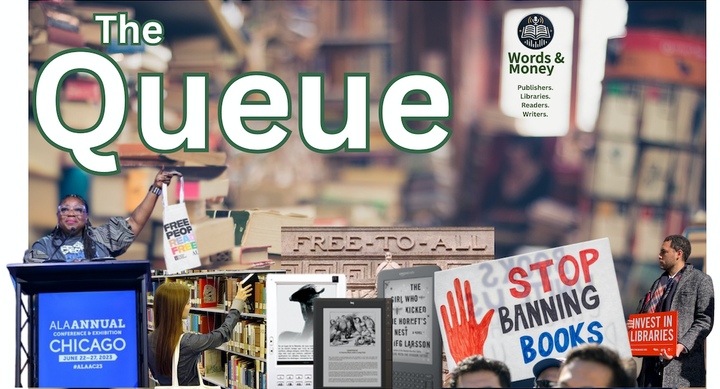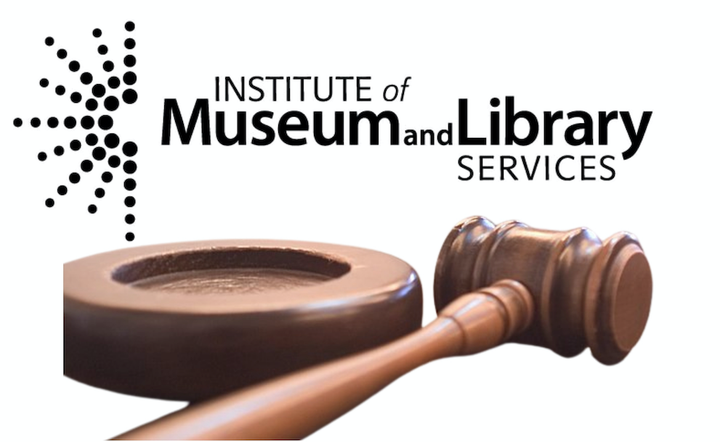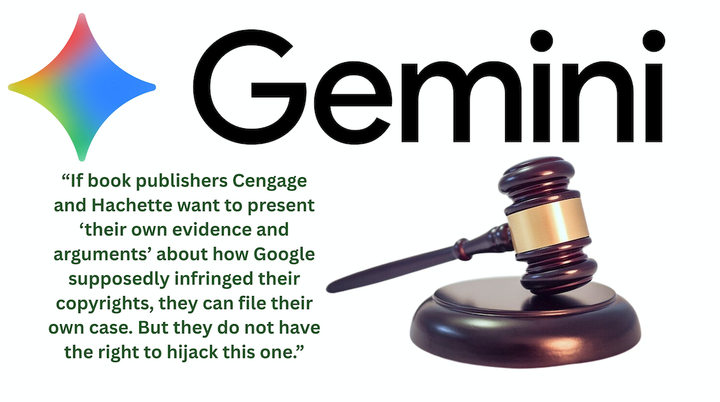The Queue: Library News for the Week Ending August 1, 2025
Among the week's headlines: Michigan librarians advocate for more support; GOP lawmakers in Ohio want to restore vetoed restrictions on LGBTQ+ content in libraries; school librarians address their challenges; and the new ALA executive director sounds an optimistic note about the future.
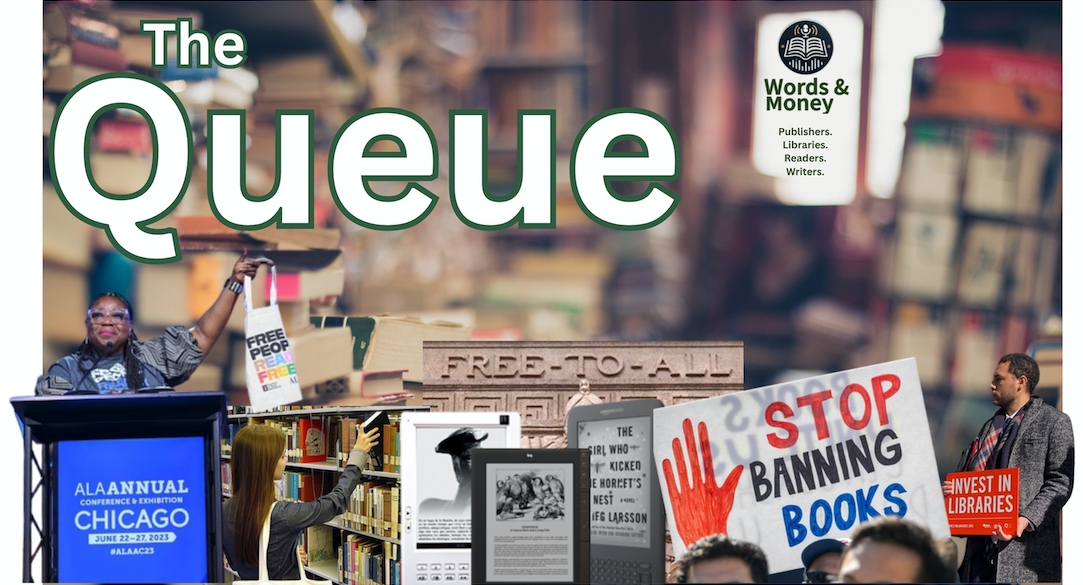
We lead this week with news via Michigan Public that the Michigan Library Association is circulating a petition asking state lawmakers (including the opening keynote speaker at the 2025 ALA Annual Conference, Governor Gretchen Whitmer) to better support libraries and protect librarians.

"Since 2021, public libraries across Michigan have confronted an unprecedented rise in coordinated attempts to ban books, restrict access to ideas, and undermine a core tenet of public libraries: to serve everyone, without bias or exclusion," the petition reads. "Despite personal and professional attacks, library workers have continued to uphold the values of free expression, equity, and access. Many are doing so under intense scrutiny, verbal harassment, and political interference, often without the support they need and deserve from their institutions, lawmakers, and community stakeholders."
The petition follows a new statewide poll commissioned by the MLA that shows strong and increasing approval of libraries, and overwhelming "statewide resistance" to censorship efforts.

Among the MLA poll's findings:
"79% approve of Michigan libraries' work (up from 71%); 75% trust librarians' collection decisions; 50% now say books should never be banned (flipped from 42% in 2023); 84% support current library policies on age-appropriate shelving; and only 4% blame libraries for children accessing objectionable content."
“Michiganders really overwhelmingly approve of the work of our libraries, as well as the content of the material on their shelves,” Dillon Geshel, interim director of the Michigan Library Association, told Michigan Public. “And folks don't really have an appetite for book bans.”
National Politics Is Changing Local Races
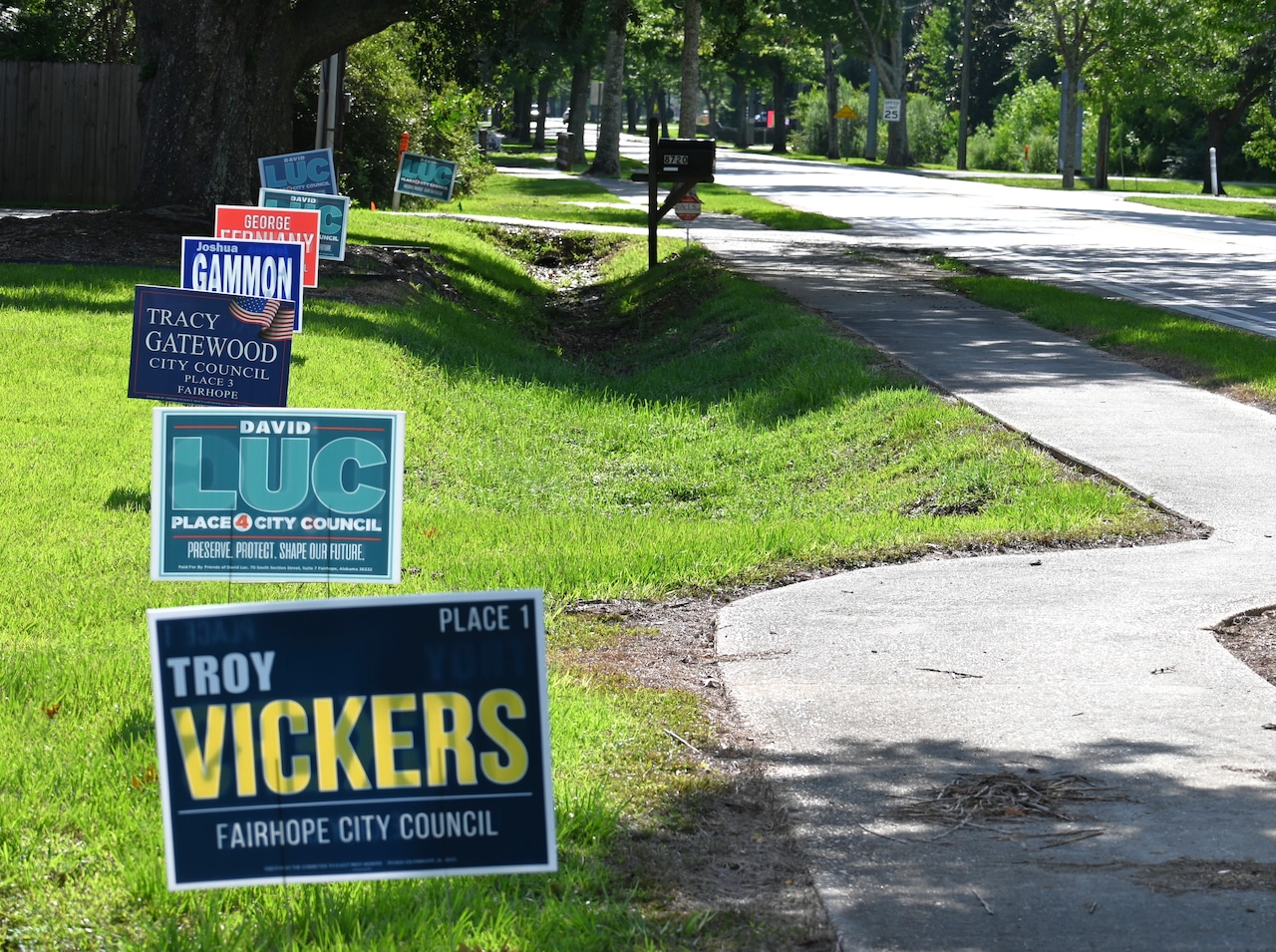
From AL.com, an interesting report this week that captures a trend we've been watching unfold for some time now amid the ongoing, nationally organized battle over book bans in schools and libraries: the increasing partisan politicization of typically non-partisan local offices.
The report notes how controversies over library materials in Alabama are "looming over the campaigns" for City Council in the city of Fairhope, where some challengers for a council seat have been labeled “Moms for Liberty candidates,” in reference to the national conservative organization that has been a force in pushing for book bans in libraries and schools. But more broadly, the report also explores how local offices that once eschewed major party affiliation are increasingly being drawn into our divisive national politics.
"Jess Brown, a retired political science professor from Athens State University and a longtime observer of Alabama state government, said he is concerned that if political parties start ramping up involvement in local races, a 'litmus test' could be applied to future candidates," the article notes. "The idea is that these officials are in charge of performing day-to-day routine functions that should be done in an efficient and prudent manner that is apolitical. You want good streets and drainage in Mobile whether (Donald) Trump is in the White House or (Kamala) Harris is in the White House," Brown told reporters. "I found government to be more efficient and making more rational decisions when you didn’t have the environment contaminated by partisanship.”
Michigan Library Board Accused of Dodging the Public
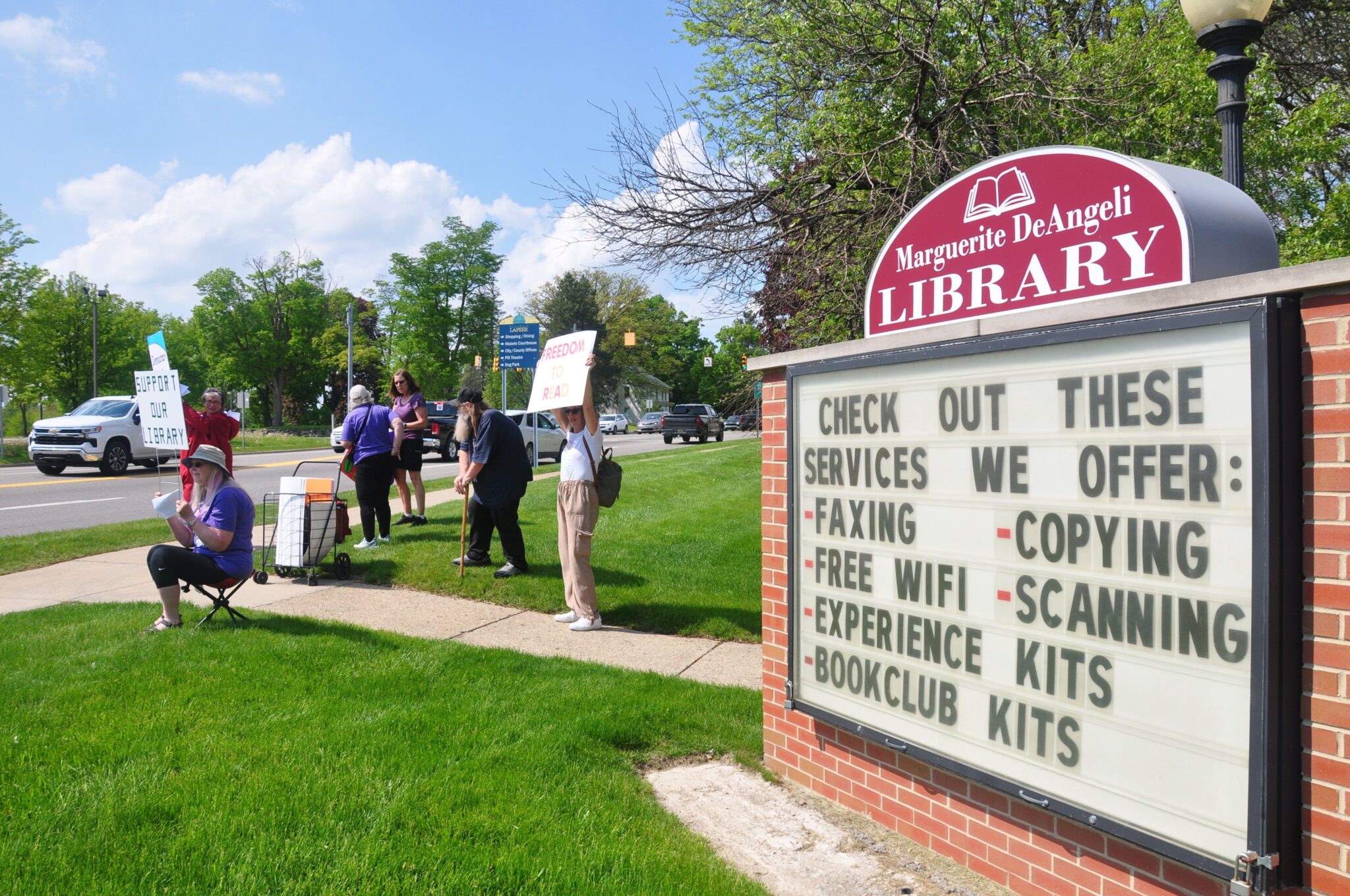
The Michigan Advance reports that the Lapeer District Library Board has moved its board meeting, and some in the community believe the decision was made in an attempt to "evade the public" amid criticism over book bans.
"The move has been viewed by some as a way to prevent community members from fighting against a rash of book challenges that began in 2023 and following the election of several members with conservative ideologies, who have come to hold a majority of seats on the nonpartisan board," the report notes.
For its part, the board said the change was made because the board's current meeting place was not suitable. But the new meeting time, which has moved to 10 a.m, on a weekday, has raised suspicions.
"Karen Braschayko, a member of Fight For the First Lapeer, which advocates against censorship within the library district, said the board’s argument about facilities issues was a thinly veiled attempt to reduce the crowd size at meetings," the paper reports. "It’s just my personal belief that they are trying to keep people like me from going,” Braschayko told the Advance. “I won’t be able to go unless I take a morning off of work or a day off of work, really.”
GOP Lawmakers in Ohio Look to Override Governor's Veto of LGBTQ Library Restrictions

Via NBC4, Republican lawmakers in Ohio are looking to override Governor Mike DeWine’s line item veto of a provision that would have required the state's public libraries to restrict minors' access to books that deal with sex and gender identity.
"DeWine signed Ohio’s next two-year operating budget in June, issuing a line-item veto for a provision mandating public libraries to place material 'related to sexual orientation or gender identity or expression in a portion of the public library that is not primarily open to the view of the persons under the age of 18,'" the report notes. But now Rep. Gary Click (R-Vickery) is calling for Republicans to reinstate the measure. "Colorfully illustrated books for children ages three and up inform children that boys can have vaginas and girls can have penises. Citizens are outraged,” Click said in a statement to NBC4.
Publishing, Bookselling Associations, PEN America Among Those Filing Amicus Briefs in Iowa Book Banning Case

The battle over the overly broad book banning provisions in Iowa's SF 496, which are currently enjoined by a federal court, is back before the Eighth Circuit Court of Appeals, with PEN America among those filing Amicus briefs urging the court to uphold a lower court ruling that found the provision unconstitutional.
"The brief argues that the law violates the First Amendment by denying students’ rights to receive information, infringes on authors’ free speech rights, and misapplies the obscenity doctrine," a release from PEN America notes.
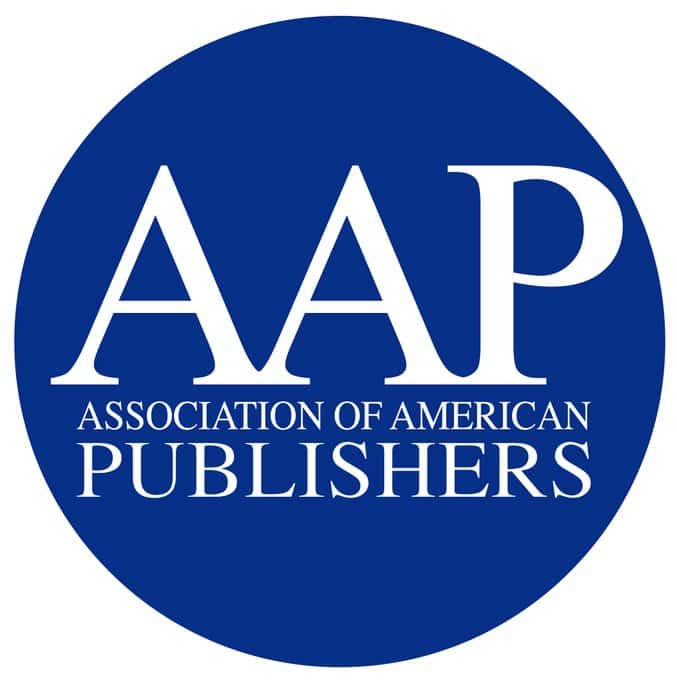
The Association of American Publishers also shared a brief filed on behalf of a coalition of publishing and bookselling associations, including the American Booksellers for Free Expression, Association of American Publishers, Comic Book Legal Defense Fund, Educational Book and Media Association, Freedom to Learn Advocates, Freedom to Learn Foundation, Half Price Books, Records, Magazines, Inc., Independent Book Publishers Association, Science Fiction and Fantasy Writers Association, and Sisters in Crime.
“The reach of SF 496’s unconstitutional restriction of books extends further than just school libraries," the AAP-organized brief states. "The law will have a direct impact on the ability of the wide range of writers, artists, publishers, distributors, and retailers that amici represent to write, create, publish, produce, distribute, and sell books and literary works of all types."
Authors Guild Celebrates Victory in Lawsuit Over Scuttled NEH Grants
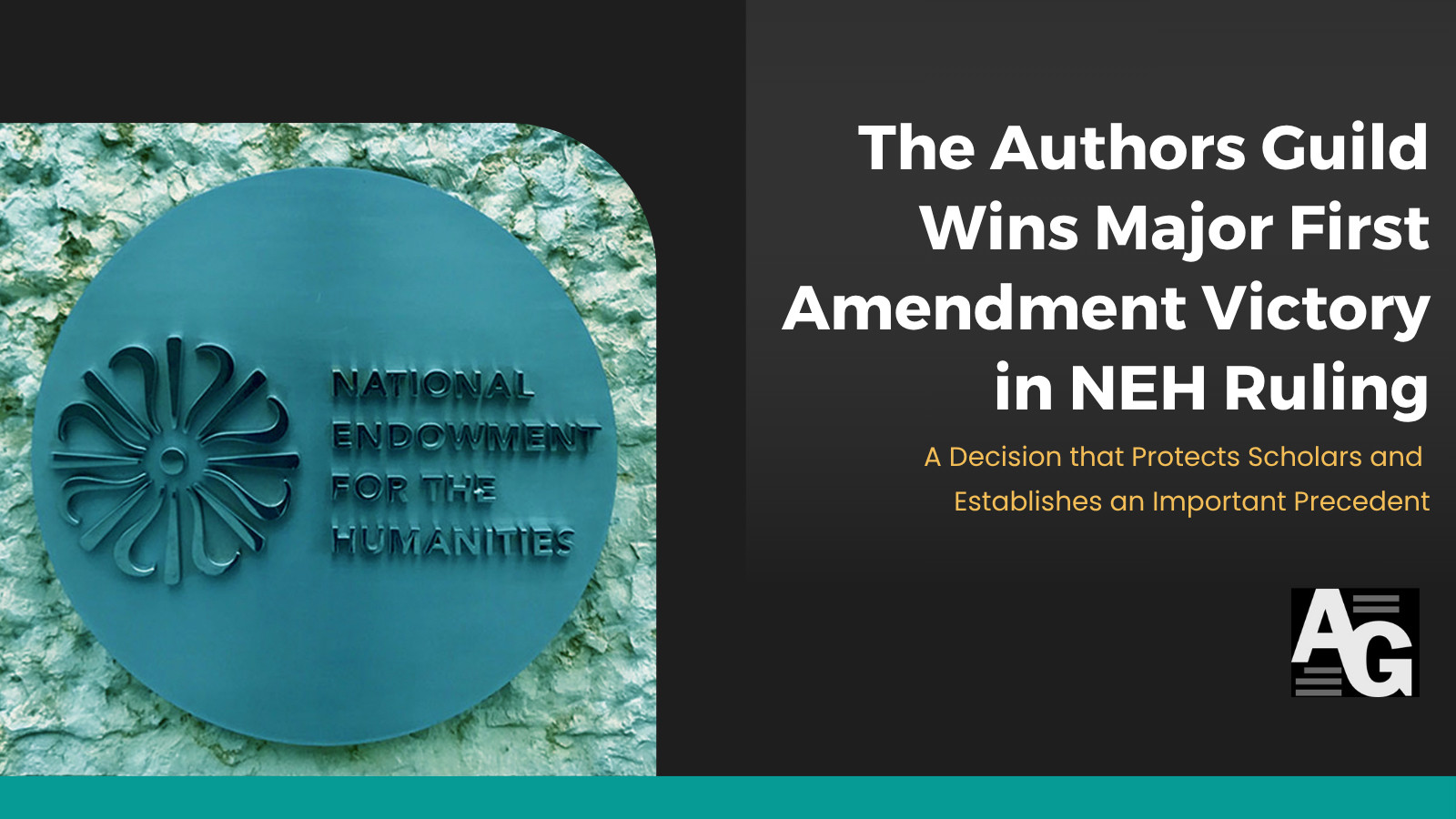
Have faith, IMLS supporters. The Authors Guild this week celebrated a major in Authors Guild v. NEH, in which a federal judge found the "mass termination of already committed NEH grants to individual scholars and authors violated the First Amendment and the Administrative Procedures Act (APA)."
In a release, the Authors Guild pointed to Judge Colleen McMahon's "exceptionally pointed language" in calling out the administration’s constitutional violations:
"Far be it from this Court to deny the right of the Administration to focus NEH priorities on American history and exceptionalism as the year of our semiquincentennial approaches. Such refocusing is ordinarily a matter of agency discretion," the post notes, quoting from the decision. "But agency discretion does not include discretion to violate the First Amendment. Nor does it give the Government the right to edit history. Adopting a singular view about American history or American exceptionalism when awarding (or terminating the award of) public funds–while excluding whole aspects of that history solely because they relate to the ostensibly 'divisive' topics of 'diversity' or 'equity' or 'inclusion,' see, e.g., Executive Order 14151, Ending Radical And Wasteful Government DEI Programs and Preferencing, issued on January 20, 2025–is a patent violation of the First Amendment."
School Librarians Talk About the Upcoming School Year
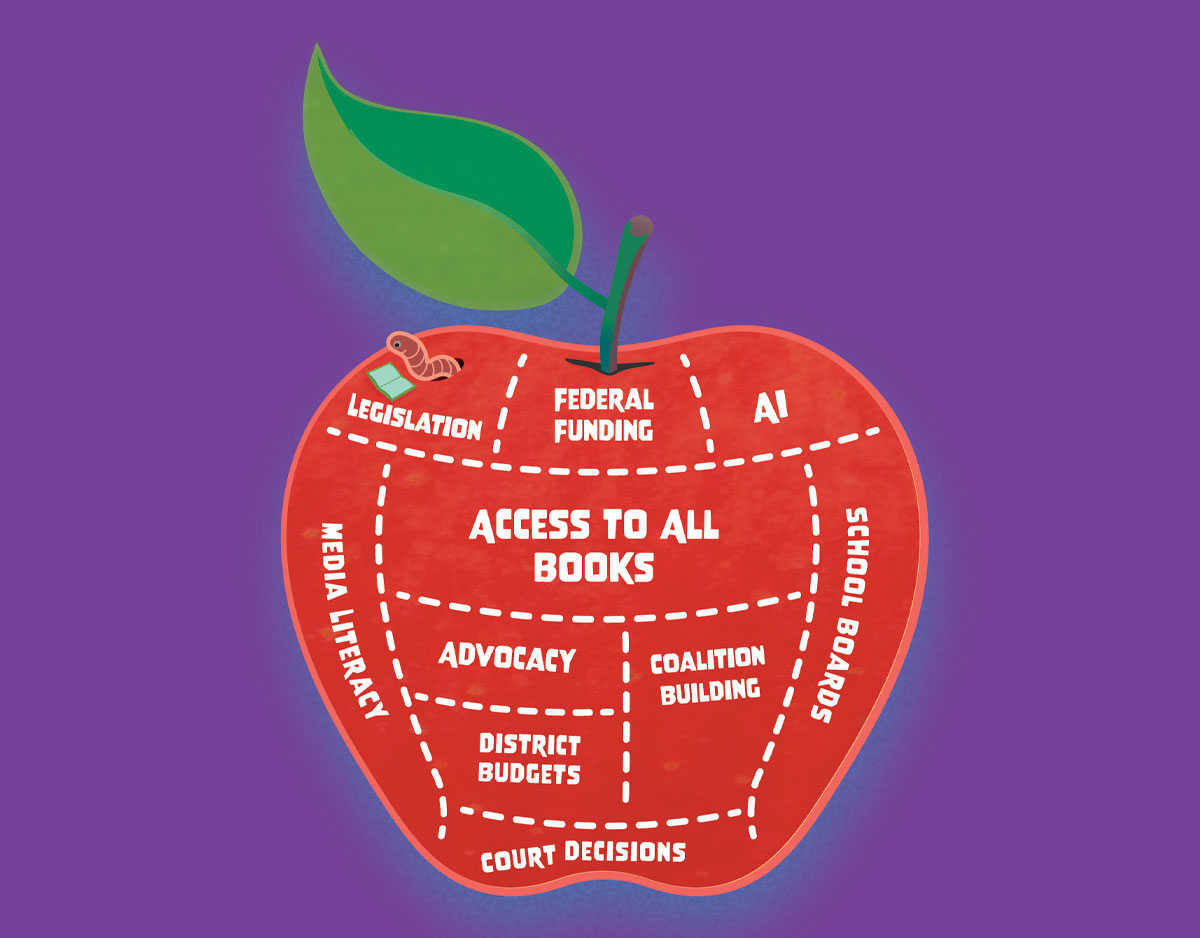
School Library Journal asked school librarians what was on their minds as they embarked on the 2025–26 school year. And it's not pretty.
"School librarians are grappling not only with the stress of local budget issues but also with the uncertainty of federal funds—those already allocated by Congress for 2025, which have been frozen by the Trump administration, as well as those in the federal budget for 2026," the report notes. "Censorship, restricted access to books, and soft censorship remain a concern for many, bringing added work hours, stress, and the responsibility of defending selections. In addition, public pressure and personal attacks have increased in number and vitriol over the last five years."
School Districts Prepare for New Texas Book Banning Law

From local NPR affiliate KERA, school districts in Texas are preparing to implement SB 13, a new law that gives control of school library collections to parent-run library councils.
"Called a 'parental rights' bill, Senate Bill 13 says districts can create a school library council that would be responsible for recommending which books can enter a school library, and which need to be removed. Signed into law after the recent regular session, it goes into effect Sept. 1," the report notes. "Critics said SB 13 takes library book purchases out of the hands of librarians and educators, and into those of trustees and their chosen members," while Texas Lt. Gov. Dan Patrick said the bill keeps “sexual content” and “woke ideologies” out of school libraries.
Another Round of Library Ebook Stories

Another week, another sign that the high costs and unwieldy restrictions around library ebooks are getting more scrutiny. "Ebooks have become increasingly popular at Fargo-Moorhead area libraries, making up more than a third of checkouts," InForum reports. "With the rise in demand comes a surprising cost, library officials say."
USA Today also had a piece this week, which addresses how IMLS cuts could impact digital collections, as did the Massachusetts-based Berkshire Eagle (both of which are paywalled). And in Wisconsin, NBC-12 purports to address the question: Why do audio books in Wisconsin's library system have such long waiting lists?
Ebook Startup Aims to Work with Libraries

Our friends at Publishers Weekly write this week about library ebook initiative Briet, the brainchild of journalist, author, and Brick House and Flaming Hydra co-founder Maria Bustillos.
"The app is a 'response to the crisis in e-book licensing and the increasing encroachment on the rights of librarians' to determine what goes into their collections and afford both print and digital books," Bustillos told PW. “I’m really concerned for the future of archiving and the preservation of digital ownership rights for libraries.”
A Look at the Anti-Book Ban Bills Passed in States
Over at Book Riot, Kelly Jensen leads off her weekly censorship news column with a look at anti-book banning bills passed thus far in state legislatures.

Librarians Seek to Preserve Censored National Park Exhibits

The Arkansas Times reports on a University of Minnesota-based campaign to "preserve displays at sites managed by the National Park Service" in response to the Trump administration’s efforts to censor exhibits.
"In April, the Arkansas Times reported that pages on the NPS website related to Central High School had been extensively censored following an executive order from the Trump administration."
And Finally This Week...

EdSurge has a Q&A with incoming ALA executive director Daniel Montgomery, who will take the helm of the association on November 10. It's a good wide-ranging talk that includes optimism on the book banning front, concern about the budget battle now taking shape in Washington D.C., and how libraries can overcome right-wing efforts to undermine them.
"I think people trust their libraries," Montgomery told the outlet. "It's incumbent on us to really make the argument to people again for why public libraries are so necessary and vital to our democracy, and to the everyday life of American families. I like to point that out because things like democracy and freedom are very broad, big ideas. They're hard to wrap your mind around sometimes. But the vital services that American families depend on, people know what that is."















